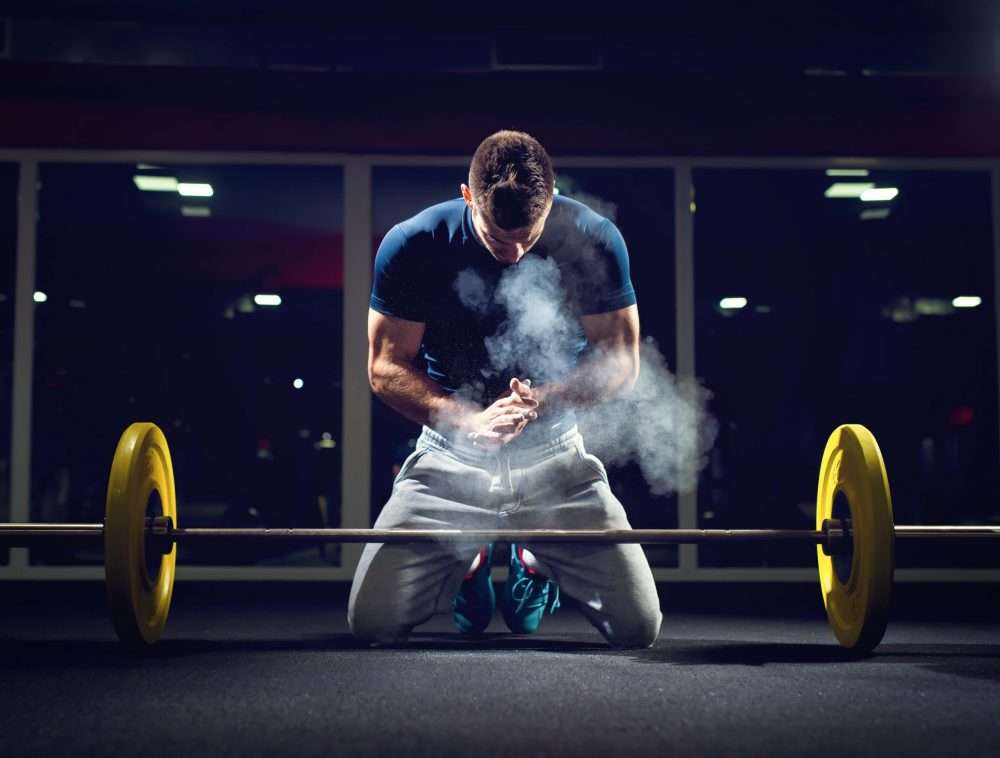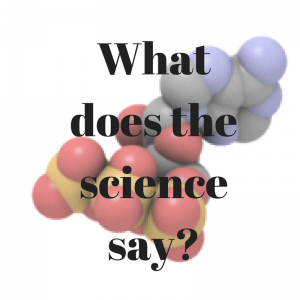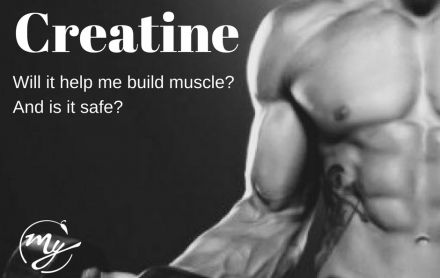February 4, 2017
CREATINE: WILL IT HELP ME REACH MY FITNESS GOALS?
Is just about everyone taking creatine to help them reach fitness goals? Creatine is, actually, the most popular ergogenic (athletic-enhancing) supplement in history! And there is always new research coming out about it. I mean ALWAYS.
If you don’t have the time or desire to sift through the tons of studies, I have a pretty nice summary here for you.
The bottom line is that there are a few very good reasons why it is so popular.

DOES CREATINE HELP PERFORMANCE (ACCORDING TO THE SCIENCE)?
Yes, creatine can increase the size of lean muscle mass when it’s used along with a resistance training program.
It improves strength and performance during short-duration, high intensity activity. So, creatine can be helpful for activities like weight-training and sprinting.
With high-dose creatine supplementation, it’s possible to increase body mass by almost 2 kg within a week; however, know that this gain is mostly (lean) water weight. On the other hand, creatine is not as helpful for longer-term, lower intensity activities like marathons. Oh, and it can also help protect your brain, heart, bones, and liver too! (Bonus!)
If you are wondering; no, creatine is NOT a steroid; and, no, you don’t need to cycle it.
HOW DOES CREATINE WORK?
Creatine is a naturally-occurring nutrient made from the amino acids arginine, methionine, and glycine. Supplementation works by increasing the creatine levels in the muscles, thereby giving them more energy. On a biochemical level, it sacrifices itself to help replenish the energy stored in ATP (your body’s energy molecule). This means that your muscles can re-use more of their ATP for energy when there is enough creatine; and therefore, use less glucose (from glycogen).
So by helping regenerate ATP, creatine helps preserve the muscle’s glycogen stores, and helps to reduce the amount of lactate produced.
Creatine also “hydrates” the muscles by pulling water into the cells with it. This increased water content is considered lean mass, and, at a cellular level, is associated with less protein breakdown, and more DNA synthesis.
Basically, creatine helps to:
- Regenerate energy in the muscle cells;
- Hydrate the muscles; and
- Reduce the amount of glycogen used, and therefore lactate produced by the muscle cells.
HOW MUCH CREATINE TO GET THESE RESULTS?
The average (sedentary) person needs about 2g/day; however this number goes up for athletes and people with higher than average amounts of “lean mass”. The number here is higher, possibly closer to 5g/day. Creatine is found in meat, eggs, and fish, and is also naturally produced by the body as a means to store energy (i.e. for ATP). Levels of creatine are highest in heart and muscle tissue.
You may have seen estimates that most people consume about 2g/day of creatine from food; however, a large study (NHANES III) showed that the number is actually closer to just 1g/day. So, seeing as the average person actually needs 2g/day, there may be many people, especially athletes, who simply need more. By taking creatine as a supplement, over and above your food intake, it helps you to get more each day. This can help your muscles to more easily recuperate the energy that they use when you work out.
While some people may not seem to benefit from creatine supplementation, this may be because they’re already getting enough from their diet. For athletes who don’t eat very many creatine-containing foods, creatine supplementation may be particularly useful.

WHICH KIND OF CREATINE IS THE BEST, AND HOW BEST TO TAKE IT?
There are several different forms of creatine available, but the most studied is creatine monohydrate. You can try a more soluble (and expensive) form if you find that you get stomach cramping with the monohydrate; just stay away from”Creatine Ethyl Ester” which almost completely degrades in your intestines and does not get absorbed. #wasteofmoney
Creatine is something that you can “load” if you want to; however, it is not necessary. Loading can help to shorten the time before you start seeing results. You can load by taking a larger amount (e.g. “loading dose”) for the first few days or weeks, and then taper it down to a regular, daily dose.

There are two ways you can take “loading doses”.
- You can take 15-20 grams per day for 5-7 days; or
- You can take 3-5 grams per day for 4 weeks.
Then, once your body has adjusted to this, you can move on to your regular, daily dose of 2-5 grams per day, indefinitely. In terms of when to take creatine during the day; results are mixed. At least one study shows more benefit from taking it immediately after your workout.
One other thing to consider; however, is that creatine has been shown to reduce fatigue. Since some people have found that it makes them feel more alert, you may consider not taking it within an hour of sleep.
WHAT POTENTIAL (NEGATIVE) EFFECTS TO LOOK OUT FOR?
Overall, creatine is considered to be a very safe supplement, even in long-term studies. Remember to take creatine with enough water to prevent stomach cramping, and ideally take it with meals. Also, if you experience gastrointestinal symptoms like diarrhea and nausea, you may be taking a bit too much. So, you can try reducing the amount you take each day, or spread the daily amount into smaller doses throughout the day.
Creatine is safe for most people, but you should consult your health care practitioner before using it if you have a kidney disorder, or if you’re pregnant or breastfeeding. Taking creatine can cause weight gain due to its ability to hydrate the muscles.
SUMMARY
- Creatine is the most popular ergogenic supplement in history.
- It improves strength and performance for short-duration, high intensity activities like weight-training and sprinting.
- Creatine works by preserving some of the muscle’s ATP, hydrating the cells and increasing their size, helping preserve the muscle’s glycogen stores, and helping to reduce the amount of lactate produced.
- Athletes can probably use up to 5g/day; and creatine can be loaded if desired.
- Overall creatine is very safe, but keep on the lookout for gastrointestinal symptoms, and speak with your health care practitioner before using if you have kidney issues, or if you’re pregnant or breastfeeding
.
REFERENCES:
Antonio J, Ciccone V. The effects of pre versus post workout supplementation of creatine monohydrate on body composition and strength. J Int Soc Sports Nutr. 2013 Aug 6;10:36. doi: 10.1186/1550-2783-10-36. eCollection 2013.
LINK: https://www.ncbi.nlm.nih.gov/pmc/articles/PMC3750511/
Brosnan JT, da Silva RP, Brosnan ME. The metabolic burden of creatine synthesis. Amino Acids. 2011 May;40(5):1325-31. doi: 10.1007/s00726-011-0853-y. Epub 2011 Mar 9.
LINK: https://www.ncbi.nlm.nih.gov/pubmed/21387089Greenhaff’ PL. The nutritional biochemistry of creatine. November 1997. Volume 8, Issue 11, Pages 610–618
LINK: http://www.jnutbio.com/article/S0955-2863%2897%2900116-2/abstract
Health Canada, Natural and Non-prescription Health Products Monograph. Accessed January 29, 2017,
LINK: http://webprod.hc-sc.gc.ca/nhpid-bdipsn/atReq.do?atid=creatine.mono&lang=eng
Jones CA, McQuillan GM, Kusek JW, Eberhardt MS, Herman WH, Coresh J, Salive M, Jones CP, Agodoa LY. Serum creatinine levels in the US population: Third National Health and Nutrition Examination Survey. December 1998 Volume 32, Issue 6, Pages 992–999
LINK: http://www.ajkd.org/article/S0272-6386(98)70074-5/abstract?cc=y=
Kilduff LP, Georgiades E, James N, Minnion RH, Mitchell M, Kingsmore D, Hadjicharlambous M, Pitsiladis YP. The effects of creatine supplementation on cardiovascular, metabolic, and thermoregulatory responses during exercise in the heat in endurance-trained humans. Int J Sport Nutr Exerc Metab. 2004 Aug;14(4):443-60.
LINK: https://www.ncbi.nlm.nih.gov/pubmed/15467102
Low SY, Rennie MJ, Taylor PM. Modulation of glycogen synthesis in rat skeletal muscle by changes in cell volume . J Physiol. (1996)
LINK: https://www.ncbi.nlm.nih.gov/pmc/articles/PMC1160792/
Schilling BK, Stone MH, Utter A, Kearney JT, Johnson M, Coglianese R, Smith L, O’Bryant HS, Fry AC, Starks M, Keith R, Stone ME. Creatine supplementation and health variables: a retrospective study. Med Sci Sports Exerc. 2001 Feb;33(2):183-8.
LINK: https://www.ncbi.nlm.nih.gov/pubmed/11224803
Spillane M, Schoch R, Cooke M, Harvey T, Greenwood M, Kreider R, Willoughby DS. The effects of creatine ethyl ester supplementation combined with heavy resistance training on body composition, muscle performance, and serum and muscle creatine levels. J Int Soc Sports Nutr. 2009 Feb 19;6:6. doi: 10.1186/1550-2783-6-6.
LINK: http://jissn.biomedcentral.com/articles/10.1186/1550-2783-6-6
Thompson CH, Kemp GJ, Sanderson AL, Dixon RM, Styles P, Taylor DJ, Radda GK. Effect of creatine on aerobic and anaerobic metabolism in skeletal muscle in swimmers. Br J Sports Med. 1996 Sep; 30(3): 222–225. PMCID: PMC1332335
LINK: https://www.ncbi.nlm.nih.gov/pmc/articles/PMC1332335/
Creatine: Is it Safe? Effective?
The entire contents of this website are based upon the opinions of Build Holistic Nutrition. Please note that Build Nutrition is not a dietitian, physician, pharmacist or other licensed healthcare professional. The information on this website is NOT intended as medical advice, nor is it intended to replace the care of a qualified health care professional. This content is not intended to diagnose or treat any diseases. Always consult with your primary care physician or licensed healthcare provider for all diagnosis and treatment of any diseases or conditions, for medications or medical advice, as well as before changing your health care regimen.
© BUILD NUTRITION 2026. ALL RIGHTS RESERVED. PRIVACY POLICY
Go ahead, creep us on social. You know you want to!
